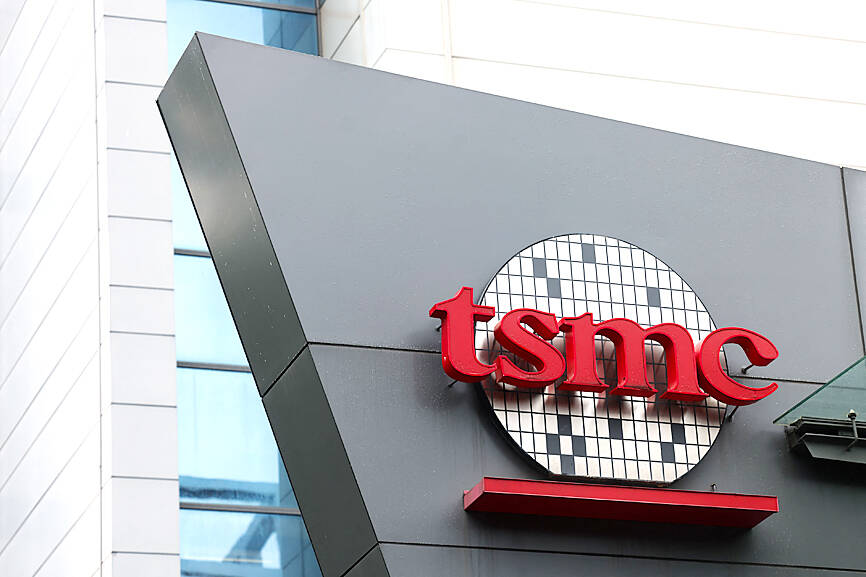Taiwan Semiconductor Manufacturing Co (TSMC, 台積電) shares reached a record high on Monday in New York trading, as the world’s largest contract chipmaker is poised to cap its best annual stock performance in 25 years.
The stock climbed as much as 1.4 percent in Taipei yesterday, briefly surpassing its Nov. 8 peak, before erasing the gain to end flat at NT$1,080.
The move came after US chip stocks, including key customer Nvidia Corp, rallied on Monday. TSMC shares are up 82 percent this year amid continued investor enthusiasm for artificial intelligence (AI) trades.

Photo: I-hwa Cheng, AFP
“For us, TSMC remains the best way to play the AI theme without having to pick a winner or a technology, at a reasonable valuation,” said Kevin Net, head of Asian equities at Financiere de l’Echiquier.
The next catalyst to watch would be Nvidia’s presentation at Consumer Electronics Show next month as well as TSMC’s upcoming results and guidance, he added.
With a client list including Apple Inc and Advanced Micro Devices Inc, TSMC has been a major beneficiary of the boom in AI spending. The company is expected to report sales growth of 36 percent for the last quarter of the year, with a gross margin at 58.3 percent, the highest since 2022.
Unlike TSMC, which dominates the high-end chip market, companies specializing in mature IC processes saw strong buying interest yesterday in Taipei, after the US President Joe Biden administration on Monday launched a trade probe into Chinese-made “legacy” semiconductors, with United Microelectronics Corp (聯電), Taiwan’s second-largest contract chipmaker, rising 4.05 percent to close at NT$36.
Additional reporting by CNA

HANDOVER POLICY: Approving the probe means that the new US administration of Donald Trump is likely to have the option to impose trade restrictions on China US President Joe Biden’s administration is set to initiate a trade investigation into Chinese semiconductors in the coming days as part of a push to reduce reliance on a technology that US officials believe poses national security risks. The probe could result in tariffs or other measures to restrict imports on older-model semiconductors and the products containing them, including medical devices, vehicles, smartphones and weaponry, people familiar with the matter said. The investigation examining so-called foundational chips could take months to conclude, meaning that any reaction to the findings would be left to the discretion of US president-elect Donald Trump’s incoming team. Biden

INVESTMENT: Jun Seki, chief strategy officer for Hon Hai’s EV arm, and his team are currently in talks in France with Renault, Nissan’s 36 percent shareholder Hon Hai Precision Industry Co (鴻海精密), the iPhone maker known as Foxconn Technology Group (富士康科技集團) internationally, is in talks with Nissan Motor Co’s biggest shareholder Renault SA about its willingness to sell its shares in the Japanese automaker, the Central News Agency (CNA) said, citing people it did not identify. Nissan and fellow Japanese automaker, Honda Motor Co, are exploring a merger that would create a rival to Toyota Motor Corp in Japan and better position the combined company to face competitive challenges around the world, people familiar with the matter said on Wednesday. However, one potential spanner in the works is

SEMICONDUCTORS: Samsung and Texas Instruments would receive US$4.75 billion and US$1.6 billion respectively to build one chip factory in Utah and two in Texas Samsung Electronics Co and Texas Instruments Inc completed final agreements to get billions of US dollars of government support for new semiconductor plants in the US, cementing a major piece of US President Joe Biden administration’s CHIPS and Science Act initiative. Under binding agreements unveiled Friday, Samsung would get as much as US$4.75 billion in funding, while Texas Instruments stands to receive US$1.6 billion — money that would help them build facilities in Texas and Utah. The final deals mean the chipmakers can begin collecting the funding when their projects hit certain benchmarks. Though the terms of Texas Instruments’ final agreement is

Call it an antidote to fast fashion: Japanese jeans hand-dyed with natural indigo and weaved on a clackety vintage loom, then sold at a premium to global denim connoisseurs. Unlike their mass-produced cousins, the tough garments crafted at the small Momotaro Jeans factory in southwest Japan are designed to be worn for decades, and come with a lifetime repair warranty. On site, Yoshiharu Okamoto gently dips cotton strings into a tub of deep blue liquid, which stains his hands and nails as he repeats the process. The cotton is imported from Zimbabwe, but the natural indigo they use is harvested in Japan —